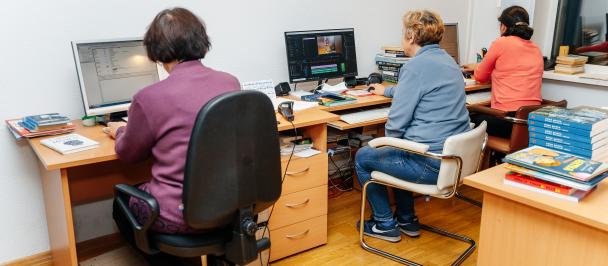In Honduras, iVerify partners with local university to support national elections
February 10, 2022

After a successful deployment during Zambia’s elections last summer, iVerify pivoted to support elections in Honduras in November 2021. By capitalizing on the lessons learned in Zambia, and redesigning the system around local resources to meet the requirements of the Honduran electoral context, iVerify demonstrated that it is flexible enough to support elections in a variety of contexts.
Developed by UNDP through the Brussels-based Task Force on Electoral Assistance and the Chief Digital Office, iVerify is a fact-checking initiative which combats the spread of false narratives during election periods and beyond by combining new technology like AI and machine learning with tried-and-true in-person fact checking. Zambia’s contentious August elections were an opportunity for the initiative to illustrate its efficacy. But in some ways, Honduras was the real sustainability test for the system: having proved itself in Zambia, iVerify had to demonstrate its adaptability and relevance in a very different national context.
Localizing iVerify to the Honduran context was a technical challenge. “The challenges in Honduras are very different from the ones we saw in Zambia,” says Mathilde Vougny, who works on UNDP’s electoral assistance team in Brussels. “The information landscape is very specific, with a lot more fake account activity, and more coordinated action to spread false narratives.”
“The challenge of disinformation in Honduras was daunting,” added her colleague Gabriel van Oppen, who was deployed to Honduras to support the system during November and December. “Disinformation in Honduras is well-orchestrated and well-directed. It really wreaks havoc here. Something can be created in the morning and by night nearly the whole country has seen or heard it.”
Despite the challenges inherent to the Honduras context, iVerify delivered fact-checked information in an election fraught with false narratives and disinformation. The iVerify team accomplished its goal with funding from the European Union, and in collaboration with UNDP Honduras and respected local university La Licenciatura en Periodismo de Ceutec. As part of the collaboration, iVerify team members supported fourth-year journalism students to verify news items reported by members of the public. Over the course of the election period, over 1,700 users in Honduras visited the iVerify platform to request fact-checking, and 37 fact-checking reports were verified and published.
A major early challenge for the iVerify team in Honduras was the suspicion of impartiality that follows many governmental and international actors. In a country where accusations of corruption are common, assessing the image and credibility of national stakeholders was crucial. “It’s difficult to find an actor [working on the election] that is considered impartial by everyone,” says van Oppen. “Very quickly actors are accused of being too close with this party or the other,” making it difficult to identify trusted partners to conduct the work of fact-checking with credibility.
For this reason, the iVerify Honduras team assessed the credibility of its local partners as carefully as their business practices. La Licenciatura en Periodismo de Ceutec fit the bill exactly. From the very beginning of negotiations, “we had high expectations” of the partnership, says van Oppen. The university was “already referenced and well-respected by national partners,” he goes on, lending iVerify a valuable aura of gravitas and professionalism.
In tackling the challenges specific to the Honduran political environment, the iVerify team benefited greatly from the groundwork laid in Zambia. The IT platform the team developed for Honduras took only one month, rather than the five months it had taken in the leadup to the Zambia project. Because of the experience in Zambia, “we knew a lot better the red flags we needed to prepare for from the beginning,” says Mark Belinsky, who works as a digital innovation and scaling specialist supporting the iVerify initiative from UNDP’s Chief Digital Office. “The iVerify Honduras team benefitted enormously from the work, knowledge, and lessons learned from the experience in Zambia.”
For example, drawing on iVerify’s experience in Zambia, the team understood what type of disinformation may circulate before, during, and after polling day, as well as the importance of countering them in the fastest, most transparent, and precise manner. "Credibility is key and has to be carefully safeguarded,” said van Oppen. “Early errors in fact-checking can tarnish the image of the system and severely hamper the way in which it is perceived by the local population, thus affecting the overall impact and efficiency of the system."
The partnership with the university also points to an intriguing new value proposition for iVerify as it rolls out to countries all over the world. The fourth-year journalism students enrolled in classes aligned with the iVerify initiative are required to participate in the fact-checking process to graduate. Next year, there will be a new set of fourth-year university students working on a new set of issues, as those who graduated this year go out into the world taking with them their learnings from the initiative.
“The involvement of students and young people takes iVerify beyond being simply a fact-checking initiative,” says Vougny. “We’re working with a university to train students in journalism and in issues of disinformation which are so critical to the modern political context. This was a very attractive option for us from the point of view of long-term sustainability.” With this approach, iVerify was both supporting the fact-checking effort and also training young journalists on concrete cases of disinformation and hate speech during elections.
As the iVerify team looks ahead – to the 2023 elections scheduled in Liberia, and beyond – they are excited about applying this success from Honduras. “We can learn a lot from this experience in Honduras for some of the next countries to which we offer support,” said Gianpiero Catozzi, Coordinator of the Brussels-based Task Force on Electoral Assistance. “We’re currently in discussions on how to involve universities around curriculum building and fact-checking in Liberia.”

 Locations
Locations



